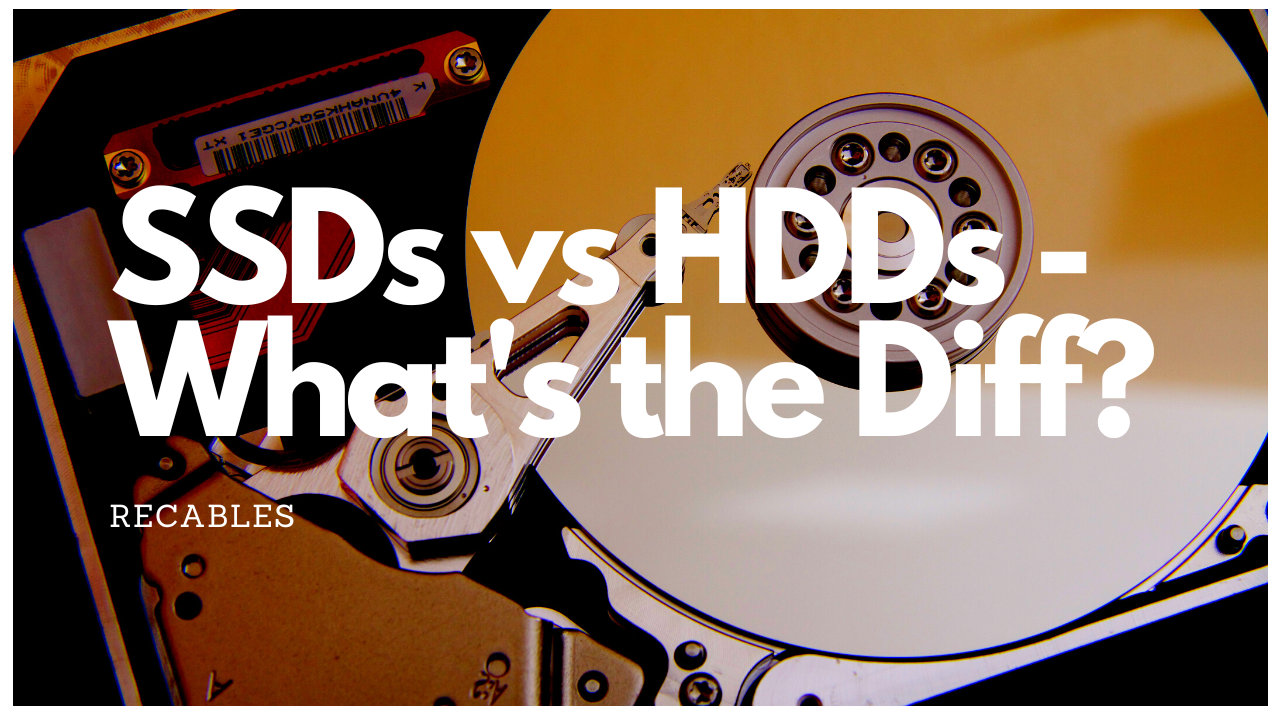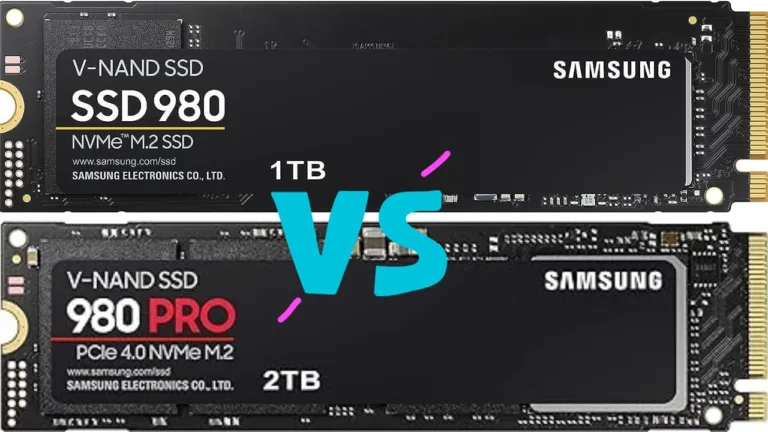What Is The Difference Between SSDs and HDDs
Deciding between Hard Disk Drives (HDDs) and Solid State Drives (SSDs) but not sure what the differences are and which one is right for you? Well, you’ve come to the right place as we explore the differences between these two storage options for your computer or laptop in this article.

HDD stands for Hard Disk Drive and they are based on spinning disks where your data is being stored. SSD stands for Solid-State Drive and these don’t have physical spinning disks, instead relying on integrated circuits to store data persistently.
When comparing HDDs and SSDs, there are a few main points of comparison: speed, price and reliability. Let’s compare them in more detail.
Speed
There’s a significant difference in speed between the two types of storage devices. Hard Disk Drives perform read write operations using spinning physical disks that are slower than the SSD drives. Let’s say you’re copying files between two solid state drives. The transfer speed could be as high as a few hundred Mbps while a HDD can only do around 100 Mbps. This makes SSDs at least a couple of times faster than traditional hard disks.
Price
The other important point of comparison is price. HDDs are cheaper than SSDs and offer a better dollar per Gigabyte ratio but the difference is narrowing and SSDs are becoming cheaper with every passing year. A 10 TB hard disk costs around a few hundred dollars and SSDs are typically 2 TB maximum. You’d need to buy 5 SSDs to match one HDD in terms of storage capacity. HDDs are definitely the budget-friendly option.
Durability
Solid-state drives are more durable than Hard Disk Drives because they don’t have any internal moving parts. SSDs can survive a fall without much issue although it is still not advisable to drop them. On the other hand, when you drop a hard disk, they’re sensitive to the slightest damage, particularly with the alignment of the disks.
To be fair, HDDs are pretty reliable these days but since they have moving parts, they will eventually die. I’m sure everyone is familiar with the dreaded clicking noise that hard drives make. So for laptops and tablets which experience more shocks in day to day usage, I’d choose an SSD over a HDD.
Power usage
SSDs are based on flash memory without any moving parts and so they require less power than traditional hard disks with their spinning disks. If you want to complement your power-friendly CPU and GPU, an SSD would help your battery last longer.
Summarizing The Differences Between HDDs and SSDs in Tabular Form
| HDD | SSD | |
| Size | Usually available only in 3.5” (desktop) and 2.5” (laptop) sizes | Available in 2.5”, 1.8” and 1” sizes |
| Speed | 5000 to 10,000 μs access speed | 35 to 100 μs access speed |
| Reliability | Has moving disks that are more vulnerable to physical damage and wear and tear. Expected life expectancy of 5-10 years. | No moving parts so more resistant to drops. 10+ year life expectancy. |
| Noise | Spinning disks and moving head will make noise when operating | No moving parts so it won’t make much noise when working |
| Power | Higher power consumption because more energy is required to make the parts move | Lower power consumption means less heat production which in turn improves battery life of laptop |
Which to Choose – SSD or HDD?
Now that you know the key differences between SSDs and HDDs, the next question to decide is which one is more suitable for your needs?
You will need to analyze and consider what your needs are to figure out what’s most important. Fir example, if you’re going to be doing video editing which requires a lot of io writes to the storage device, an SSD would be a better choice. On the other hand, if your storage device is going to be mainly for file storage – like movies, music and documents, where speed isn’t as important as storage capacity, then a HDD might be a better choice.
Think of your specific requirements and the kind of computer you’re going to build. Then consider your budget and how much money you can spend. Unless money isn’t a concern, you are going to have prioritize either storage or performance. If you don’t need a lot of storage but you need things to open really fast on your computer, then a smaller capacity SSD would be a good choice. Need a lot of storage but it isn’t time sensitive, then a HDD could be the better choice.
Here are two common scenarios. If you’re building a work computer for tasks such as sending emails, MS Office tasks, writing blog posts and surfing the Internet, a HDD should be more than enough as your tasks don’t require and heavy input output operations. So you can save a couple of hundred dollars and get more storage space with a HDD.
If you’re building a gaming PC or going to be doing a lot of video editing, then an SSD would be a better choice because they require a lot of intensive data transferring between the RAM and storage device. Performance and speed is typically an important factor here.
Summary
SSDs and HDDs are storage devices for your computer, where you can store not only your documents and videos but also your application files that get read into your computer’s memory when your application runs.
SSDs are faster, more durable and consume less power than typical HDD drives but that comes at a cost. They’re around 3-4 times more expensive than HDDs and also do not come in the large storage sizes like HDDs do.


